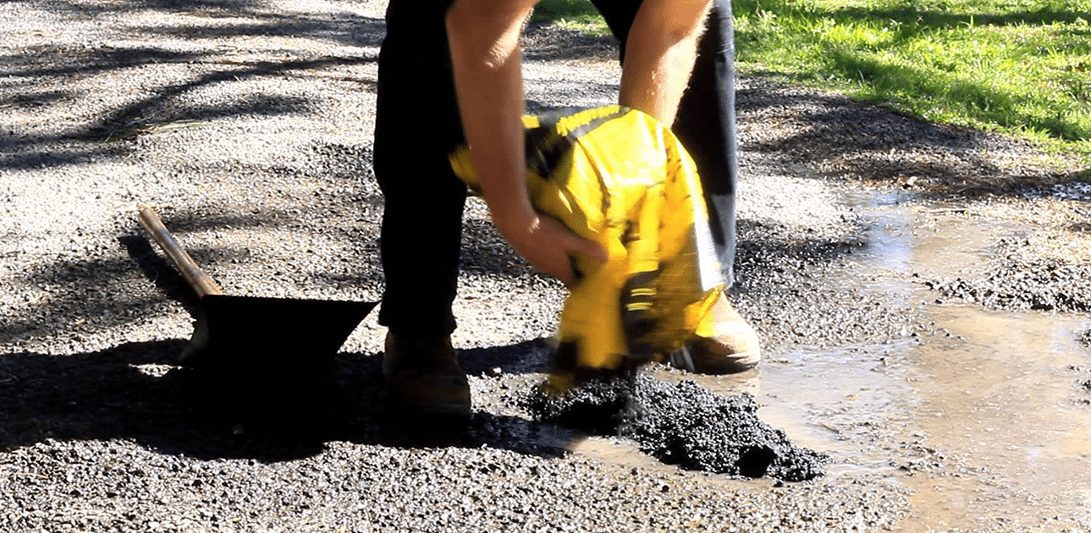Asphalt in a Bag is a lightweight and easy-to-use pre-mixed bituminous mixture that contains aggregates, bitumen, and a copolymer. It works in any weather to create a durable bonding medium.
5 Benefits of Asphalt in a Bag
Asphalt in a bag has been used in the construction and repair of homes and buildings around the world since the early 1900s. It’s still commonly used today as an effective way to resurface driveways, sidewalks, porches, patios, pool decks, and more. If you know how to choose the right product, it can be an effective way to repair cracks, holes, or uneven surfaces in just about any place you’d find in your home.
Asphalt in a bag is gaining popularity, particularly among commercial landscapers who desire to add value to their products without increasing overhead. While asphalt in a bag is used for various applications beyond driveways, it’s best known as a driveway sealer. Let’s take a closer look at seven benefits of asphalt in a bag that you might not have known about before reading this article.
1) Easy to install
One of the chief advantages asphalt in a bag has over traditional paving materials is that it’s easy to install. Traditional paving materials such as concrete and brick are heavy and difficult to move into place, and often require special equipment and hard-to-find raw materials to pour.
Still, you can simply bring asphalt in a bag and put it on your shoulder to walk around. As it is light and easy to carry, you do not need any heavy construction tools to install. This is perfect for DIY homeowners who want to fix their own driveways and patios. It is also great for small businesses that need a simple way to build up their space without spending too much money or time on complicated construction projects.
2) Flexible
You can make adjustments after asphalt seal coating has been laid, unlike traditional seal coating, which requires waiting for it to dry. This is convenient if you are concerned about weather conditions or traffic and want to re-seal your driveways as soon as possible.
If a pothole forms in the street or your driveway suffers from some damage, you can fill it with asphalt in a bag and create an attractive (and functional) surface again. Asphalt doesn’t settle, like other patching methods do, so it won’t leave bumps behind. Instead, it stays smooth and flat.
3) Long-lasting
Asphalt in a bag lasts for years, perhaps even decades. It outlasts traditional asphalt products because it does not need re-coating or replaced. Plus, there’s no need to tear up your driveway, patio, or walkway and lay down more asphalt. Just fill cracks and holes with asphalt in a bag, and you’ll have an everlasting protective layer that won’t wash away with time or weather.
Permanent patch kits often rust through and cause more holes to form in the driveway. To avoid this, asphalt in a bag should be used instead.
4) Looks Great
Contractors use asphalt for driveways, sidewalks, and to fill potholes. Asphalt is also sometimes required by law to be used in new construction projects.
When someone is building a driveway or parking lot, they usually spread hot asphalt over the surface—often over grass or other vegetation. When they do so, they create an eyesore at best and contribute to environmental problems at worst.
If you are going to undertake these types of home improvement projects, make sure that you remove all overgrowth before laying down asphalt. Otherwise it will negatively affect your property.
5) Quick and Easy DIY project
Asphalt in a bag is an affordable and simple way to cover cracks and worn areas. You can install it by cutting open one bag of pellets and dumping them onto your driveway or sidewalk. Then spread them around with a rake until it looks right (you might want more or less coverage).
A word of caution: Asphalt in bags is not recommended for driveways where there will be heavy traffic or where the temperature might get below freezing. However, asphalt in bags can be an effective and economical option for small jobs.
What Can We Learn From the Asphalt in a Bag?
The most important thing we can learn from asphalt that has been placed in bags is that asphalt and concrete are one in the same. If you have asphalt driveway paving, you have concrete driveway paving; if you are paving a parking lot or street with asphalt, you are also pouring concrete.
If you regard binders made from asphalt and those made with Portland cement as essentially interchangeable, you will have a better sense of ease concerning cost savings or other concerns when choosing between them.




